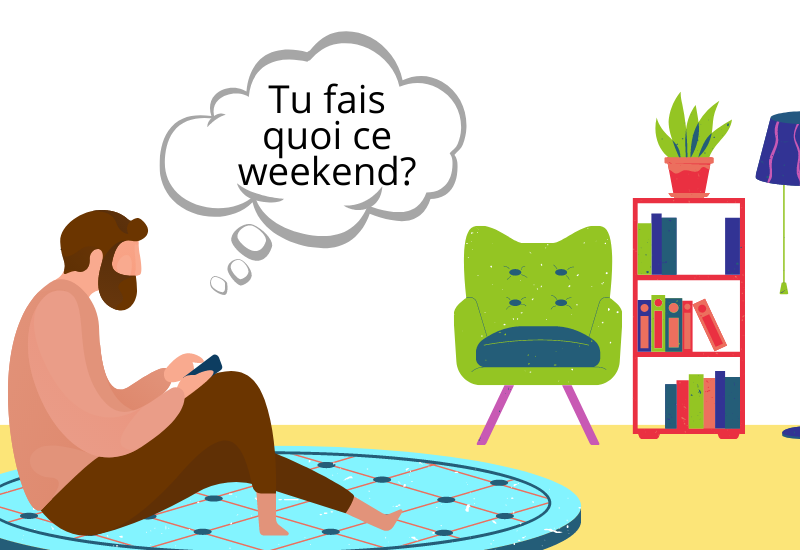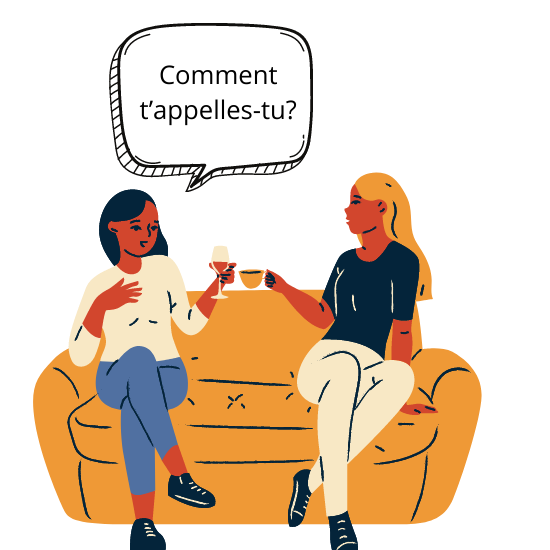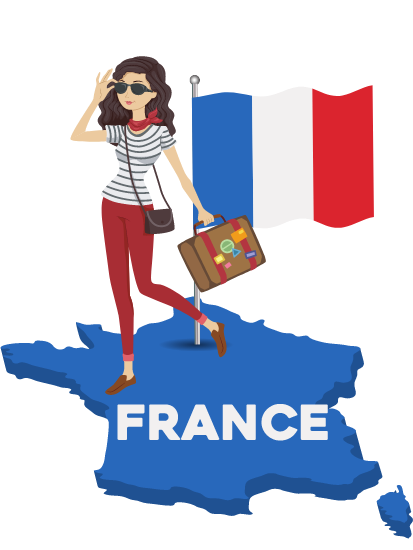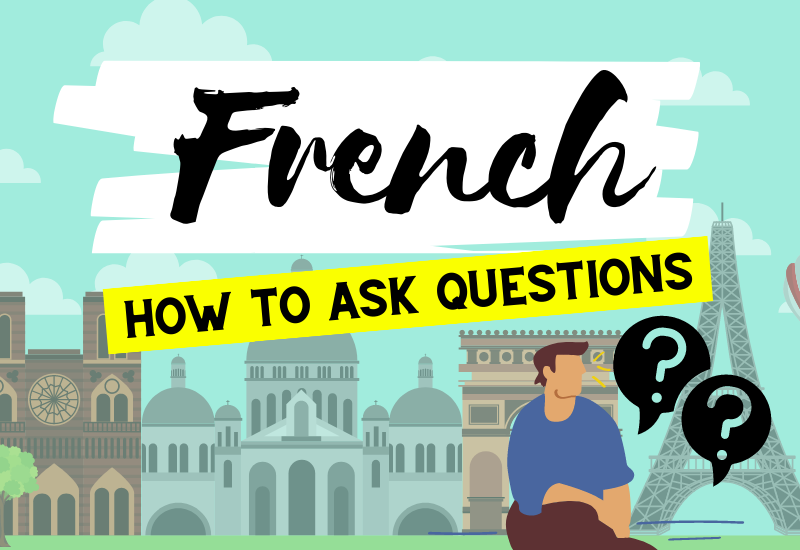Knowing how to ask questions in a foreign language you learn is one of the essential components in language learning. If you’re finding ways to figure out how to ask questions in French, then this is exactly where you should be! Stick with me to discover the easy ways to understand French question words.
How To Ask Questions In French?
Everyone knows the WH-question words in English – but do you know what they are in the French language? Does French even have WH-questions? Well, of course, they do! Though French interrogative words do not have the WH initials like the ones in English, there are specific words used by the French people to address what, who, when, where, why, and how.
In French, there are multiple ways to interrogate people – you can use question words, alter your voice intonation, or restructure your sentence. In today’s blog, we’ll focus on how to ask questions in French by using its question words.
French For Beginners: Basic Question Words In French
Let’s see the common words and expressions French people use to ask questions, along with its English translation:-
- Qui – Who
- Quoi – What
- Où – Where
- Quand – When
- Pourquoi – Why
- Quel/Quelle – Which
- Comment – How
- Combien – How many/much
This list constitutes some of the basic words you can found in French questions. Before you start using these words, I suggest you get familiar with the words from the list and try to include some of them in your conversation and banter with native French people. Now, let’s see how these question words can be used individually when speaking French.
How To Ask What In French?
Though the question ‘what’ is listed as quoi in French, the question word can change according to the context and formality of the conversation. Normally, quoi is used if a person wants to ask ‘what’ to someone in a rather formal setting:-
A quoi penses-tu? = What are you thinking about?
However, as this word is strictly formal, is it rarely used by the French people in the spoken context. As the spoken context is usually informal, the native French (mostly among the youth today) will put the quoi in the middle instead of in front of the question. So, if you have mingled around with French Millenials, you’ll typically hear this expression:

Tu fais quoi ce weekend? = What are you doing this weekend?
Though the sentence can be quite inaccurate according to French grammar, this type of word order is common among the native speakers.
Plus, in French, the question ‘what’ can be translated into other words. If you want to know what your friend is doing, you can simply say:
Que fais-tu? = What are you doing?
If you want to get new friends and wish to ask “What’s your name?”, then this expression has to be at the back of your head:
Comment vous appelez-vous ? = What is your name?
To drop the formality, you can use comment t’appelles-tu as comment vous appelez-vous is suitable for formal contexts.

French Question Words – More Examples
Let’s see how you can use French question words to ask questions and how do they fit in a sentence.
1) Qui est-ce? – Who is it?
The question qui, is usually placed in front of the sentence if you intend to find out who, which specifically refers to either the subject or object in discussion. To clarify, let’s see how the question qui is located in front of the examples below:-
Qui vient? – Who’s coming?
Qui vois-tu? – Who can you see?
The word qui is also often used after the French prepositions ‘de‘ or ‘pour‘.
De qui est-ce qu’il parle? – Who is he talking about?
Pour qui est ce livre? – Who is this book for?
2) Où allez-vous? – Where are you going?
Another example with the same word order is “Où sont les toilettes?”, which means “Where are the toilets?”. If the English translation is “where is/are X?”, the question where (où) is often placed in front of the sentence. Still, similar to the example before, où can appear after prepositions.
D’où venez vous? – Where do you come from?
D’où viens-tu? – Where are you from?
3) Quand vas-tu en vacances? – When do you go on vacation?
Another different way of asking this question is “Quand est-ce que tu pars en vacances?”, which means “When are you going on holiday?”. If you are meeting up with a friend and wonder when he arrives, you can say “Quand est-ce que vous arrivez?”, which means “When do you arrive?”
But today, the usage of quand is altered with a modern twist – the popular way to use the question word is to place it at the end of the sentence instead;
Tu vas en France quand? = When are you going to France?
4) Pourquoi vas-tu à Paris? = Why are you going to Paris?

In French, the inversion technique is one common way to inquire about information. What is meant by inversion? It refers to the shift in the word order or structure of your question – rather than sticking to the traditional subject-verb agreement, the verb is placed in front, way before the subject. So, in an inversion, the verb precedes the subject.
In this instance, vas-tu à is the verb (are you going to) and it precedes the subject, which is Paris.
Pourquoi is also often used in an expression, which is why not. So if someone asks if you want to out with them (and you think of ‘yes’ as an answer), you can reply by saying “Pourqui pas!”, which is translated as “Why not!” in English.
5) Quelles chaussures te plaisent le plus? – Which shoes do you like the most?
The question word, quelles, has various forms – it is used in various different ways, based on the singularity or plurality of the subject, along with its masculine or feminine feature. In this case, the word shoes in the sentence has both feminine and plural attributes. Hence, the question word ‘which’ should be quelles. If the subject is changed to wine (singular and masculine), the question ‘which’ will be reverted to quel;
Quel est ton chanteur préféré? = Who’s your favourite singer?
6) Comment allez-vous? – How are you?
There are two ways of asking ‘how’ in French. The question is general like the one above, the French use comment. As we have learned in French basic greetings, other equal expressions of comment allez-vous are comment ça va or ça va for short (used in informal occasions only). Another example of using comment is as below:
Comment ça s’écrit? = How do you spell that?
But then, if you’re in a shop and want to inquire how much something costs, you should use combien as it means how much or how many;
Combien coûte cet ordinateur? = How much does this computer cost?
Tu en veux combien? = How many do you want?
Combien de temps avons-nous? = How much time do we have?
Asking Questions In French
As I’ve mentioned before, there are so many different ways to ask a question in French. Another way to obtain information is by using the est-ce que phrase. Essentially, est-ce que is THE phrase to say to emphasize and highlight the fact that you’re asking. Plus, if you aim to get yes and no as an answer from your interlocutor, this is the perfect way to do it. This form of interrogating and obtaining info is something easy that you should know in acquiring French. So, keep up and I’ll share the secrets behind this particular question format.
The est-ce que question form works in 3 simple steps:
- Construct a statement (the one you intend to ask your interlocutor)
Vous parlez français = You speak French - Add est-ce que in front and a question mark at the end
Est-ce que vous parlez français? = Do you speak French ? - Voila! You now have a question!
Well, now you can try and experiment with this est-ce que structure with the native speakers and see its outcome – the best practice is to do it consistently, so make sure you use it weekly.
An important tip – when you make a statement, make sure it starts with a subject (in this case, it’s you) and is followed by a verb. Plus, if you want to be more specific in your inquiry, you can always add a question word in front of est-ce que. Let’s see how est-ce que is used by the French people.
| FRENCH | ENGLISH |
| Quand est-ce que vous arrivez? | When do you arrive? |
| Qu’est-ce que tu étudies ? | What do you study? |
| Pourquoi est-ce que tu achètes un livre? | Why do you buy a book? |
| Où est-ce que tu vas ? | Where are you going? |
| Pourquoi est-ce que tu pleures? | Why do you cry? |
Want To Learn More French?
After today, you can definitely say that you acquired something new. Implement all the tips you’ve got weekly for the best results and ask your friends to check on your performance. If you want to learn more French vocabulary, grammar, and common expressions, check out Ling App – the best language app that offers free language learning with modern, interactive features!













